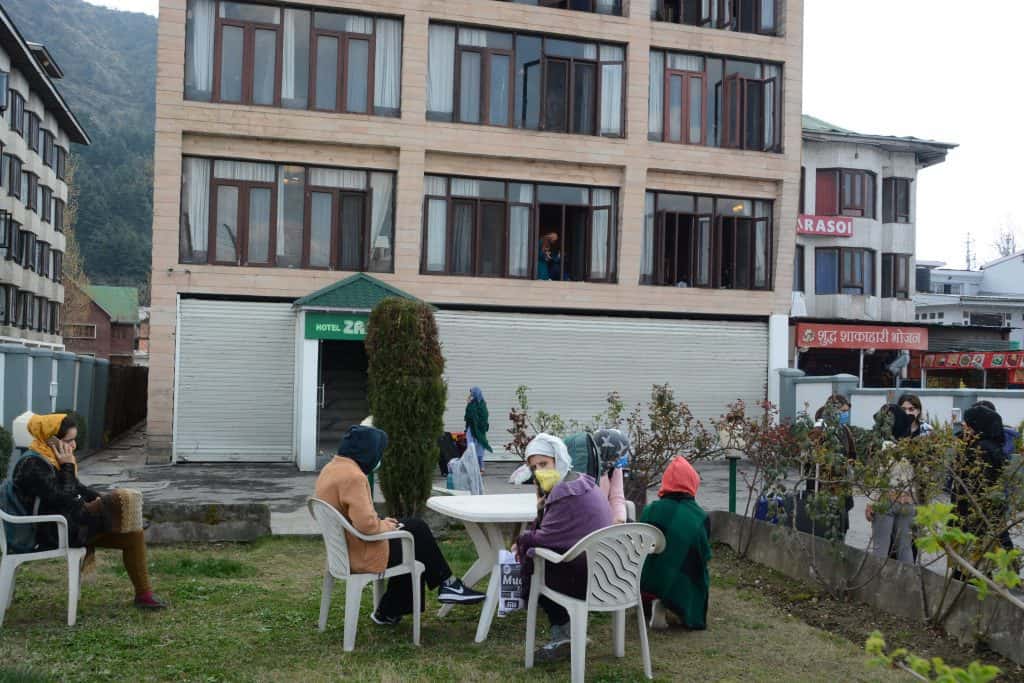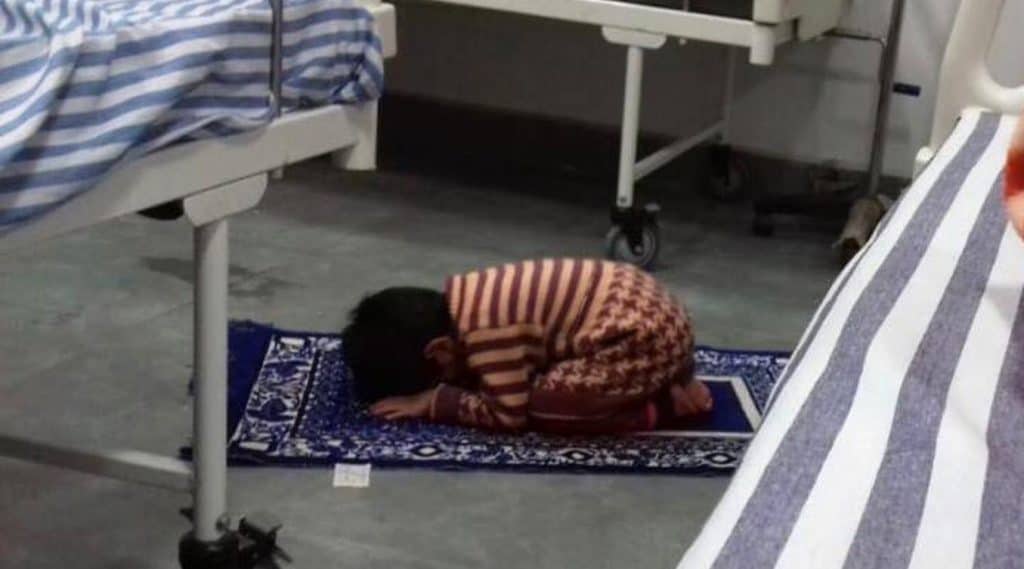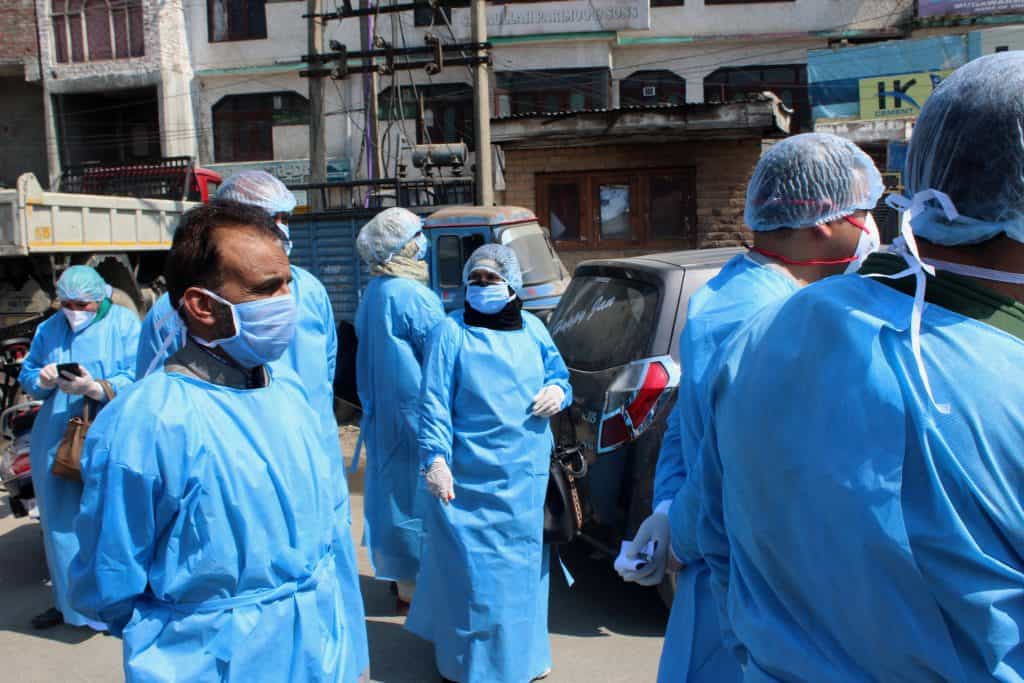Srinagar was yet to get over the shock and losses suffered from the five-month political lockdown over abrogation of Article 370. Just as schools and colleges opened on March 1st, and hopes were picking up for the tourist season, came the Coronavirus lockdown.
It began with a 65-year-old woman from Srinagar testing positive for the virus on March 18th. She had a travel history of pilgrimage to Saudi Arabia and had returned on March 16th, spent a day with family members and neighbours. The incident evoked strong criticism as the lady happened to be the mother-in-law of a senior police officer, who managed her exit from the VIP gate of Srinagar international airport. Even though authorities claimed that she was screened properly and was asymptomatic, the later positive result from the testing of her samples saw fear gripping the entire valley.
The police officer, his wife and neighbours were quarantined, all of them finally testing negative. The woman was kept under 14-day mandatory quarantine at Srinagar’s tertiary care hospital—Sher-e-Kashmir Institute of Medical Sciences (SKIMS) for two weeks after which she tested negative and was discharged.
But a bigger disaster was waiting in the form of a 65-year-old Tableegi Jamaat preacher, who had a travel history to Andaman and Nicobar, besides other parts of country and many districts of Jammu and Kashmir. A resident of Sopore area of north Kashmir’s Baramula district, the preacher was treated for cough and running nose at SKIMS hospital on the outskirts of Srinagar, and despite the patient revealing his travel history, was sent back home instead of putting him under quarantine. After his symptoms worsened, he was admitted to the Chest Diseases hospital, Srinagar, where he was put in isolation. But he lost the battle against the virus and on March 26th became Kashmir’s first COVID-19 death.
The deceased, being a preacher, had come in contact with hundreds of people in masjids and other religious gatherings across Jammu and Kashmir. Soon after his death, the administration started identifying all those who had come in contact with the preacher. Dozens of Tableegi Jamaat members were admitted in various hospitals across Kashmir. The chain was huge and the government decided to focus on those who had a travel history to Saudi Arabia and those who were part of Tableegi Jamaat, even as they appealed to people to break the chain, maintain social distance and stay at home.
Strict lockdown
As the government crackdown against those with travel history picked up pace, reports of positive cases started pouring in. March 29th (Sunday) started on a bad note as another positive patient, a resident of Tanmarg area, became the second virus casualty. Though his family denied that he was a part of or in contact with the Tableegi Jamaat, doctors said he had transmitted the disease within the community.
In its late evening bulletin on March 29th, an official spokesman said that 6465 people were under observation, 3260 under home quarantine, while 307 were under hospital quarantine. The government is reaching out to media and people through social media to enforce the lockdown and asking contacts of the victims to voluntarily come in for testing. The spokesman added that “588 samples were collected of which 542 were negative and 38 tested positive. Eight reports are awaited. Two persons have died and two have recovered.”
On the afternoon of March 30th, government spokesman Rohit Kansal tweeted that three more had tested positive in Jammu and “four more cases detected positive in Kashmir, two each from Srinagar and Shopian district (of South Kashmir). All contacts of previous positive cases.” With this, the number of positive cases in Srinagar alone went up to 17, with a total of 45 in the entire union territory.

Students who arrived in Srinagar from different foreign countries at a quarantine facility centre in a hotel, set up by government. Pic: Umar Ganie
Lack of facilities
On March 20, Srinagar, deputy commissioner Dr Shahid Choudhary imposed curbs under Section 144 in Srinagar, with his counterparts in other districts following suit. Roads were blocked at multiple points to prevent people from travelling and assembling. However, people defied curbs at many places across Srinagar. When appeals to people “not to take COVID-19 easy,” were ignored, the administration fined or detained dozens of shopkeepers for violating prohibitory orders. The police have lodged 400 FIRs till March 30th against lockdown violators that included some local clerics, who led Friday prayers in mosques on March 27th. The DC Srinagar, in his tweet on March 22nd, warned that “this is 3rd World War. Nothing less”.
J&K lags far behind in health care facilities needed to combat the virus. There are only 800 ventilators for 80 lakh people of the union territory. The administration had to close OPDs in all major hospitals across Srinagar and the valley to cater to the rising number of COVID-19 suspects. As the rising numbers of those with travel history, including those returning from holy pilgrimage of Umrah from Saudi Arabia and Kashmiri students studying in other parts of country and abroad, especially Iran and Bangladesh, became known, the administration declared 11 major hospitals as COVID-19 specific hospitals—eight in Kashmir and three in Jammu. Spokesman Rohit Kansal said 2400 treatment beds and 1000 additional quarantine beds have been set aside. Marriage halls, government guest houses and dozens of hotels in Kashmir have now been commandeered as quarantine centres.
Despite the spurt in COVID-19 positive cases, the nodal officer for Kashmir Dr SM Qadri said Srinagar has only two laboratories for carrying out coronavirus tests—one at Government Medical College (GMC) and another at SKIMS. “We have sample collection centres operational at Pulwama district of south Kashmir and at Jawahar Lal Nehru Memorial hospital Srinagar,” he told Citizen Matters. Rohit Kansal, however, asserted that the “testing rate in the union territory is over 10 per cent of those under surveillance, higher than in many states.”
Twenty-six primary contacts, who were either close family members of positive cases or had a travel history and were admitted to the Jawahar Lal Nehru Memorial (JLNM) hospital, Rainawari, broke hospital property and fled. “There are no sanitisers or hand washes, and the washrooms were stinking,” said one of them, not wishing to be named. “They are back now with the help of police,” said Medical Superintendent of the hospital Dr Zakir Ahmed. JLNM witnessed some emotional scenes as two minors—a seven-year-old girl and her eight-month-old sister, the grandchildren of the late Tableegi Jamaat preacher, are there under quarantine. A photographer on Sunday clicked a picture of the seven-year-old girl offering Namaz on the floor of the hospital ward. The picture went viral on social media.

A girl child, family member of a positive Coronavirus patient offering Namaz at a quarantine ward in JLNM Hospital, Ranawari in Srinagar. Pic: Umar Ganie
There were complaints about lack of facilities at another COVID-19 designated hospital—Chest Diseases hospital, Dalgate, Srinagar. A woman patient fled from the hospital alleging there were dogs in the wards and no doctor was available. Many other patients admitted for quarantine also alleged that the hospital lacked basic facilities and patients had to themselves buy medicines. Head of Department Dr Navid Nazir, however, blamed patients for not cooperating.
Doctors ill-equipped
On March 21st, doctors at the SMHS hospital Srinagar staged a protest claiming that they did not have N-95 masks to deal with patients suspected of being infected. Taking note of their concerns, Dr Samia Rashid, Principal, Government Medical College, Srinagar tweeted, “We have procured more than 13,000 N95 masks, 3300 personal protections kits and 22,000 triple layered masks, with another 10,000 additional triple-layered masks on order.”
Adil Ashraf, a doctor at the department of medicines at SMHS hospital Srinagar, took to his Facebook account on what he termed “mismanagement” of the administration. “Clinically stable, mild symptoms, asymptomatic COVID positive should be either home quarantined or kept in private hospitals or nearby peripheral COVID hospitals. The way things are going, our main hospitals will be flooded in less than a week,” he wrote on Facebook.
The Jammu and Kashmir government said that concealing travel history is a crime and such people were putting the entire society at risk. Rohit Kansal in a tweet on March 29th said that “a couple who tested positive in Srinagar had concealed their international travel history. Contact tracing teams are reporting that despite many appeals, people are still hiding travel histories. This is criminal. Please note–an entire society is being put at risk.”
Before Kansal, Deputy Commissioner Srinagar who is at the forefront of managing quarantine facilities and tracing people with travel history and contacts with Covid positive patients, had also tweeted asking people not to hide their travel history. “Four passengers just reached from Mauritius, Dubai and Kazakhstan declined to declare travel history. My “WHO Guidelines wala Friends” can u pl send a “Recorded Sermon” to help convince such people? Please? I beg”.
Srinagar Mayor chips-in
The one encouraging sign in all this has been the proactive Mayor of Srinagar Municipal Corporation (SMC) Junaid Azim Matoo. He was the first to order closure of schools on March 11th even though there was then no sign of any pandemic in Srinagar or elsewhere in the valley He was countered by none other than the then divisional commissioner Srinagar, who stated that schools would remain open. On March 1st, schools had re-opened in Srinagar and other districts after a gap of seven months. But the same evening, the Director National Health Mission (NHM) J&K Bhupinder Kumar announced that all schools, clubs, stadiums and restaurants would remain shut till further orders in Kashmir, endorsing the Mayor’s decisions.
Matoo is playing a crucial role in getting areas, including homes where positive cases are reported, fully sanitized. “I am playing my bit through my team that is working overtime,” said Matoo. “Let’s hope things get better soon. I am utilising all the resources available to keep Srinagar clean and ensure that the virus doesn’t spread.” Recently, the Mayor led his team and sanitised SMHS hospital, Srinagar. On March 29th, the Mayor tweeted, “Our people undoubtedly deserve better health infrastructure. Have taken a pledge to construct a world-class ‘Medical City’ at SMC’s 200 kanals+ land on the by-pass. Will start once the Covid-19 challenge is past us.”
